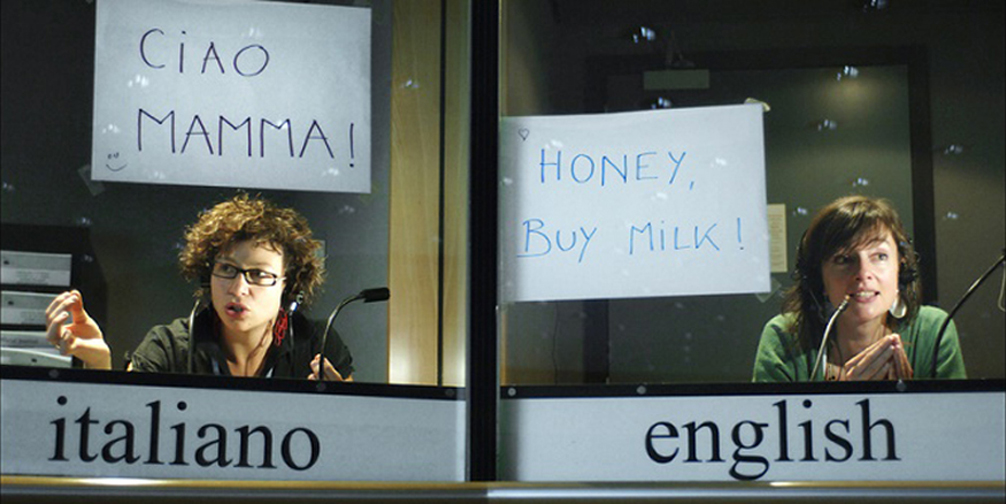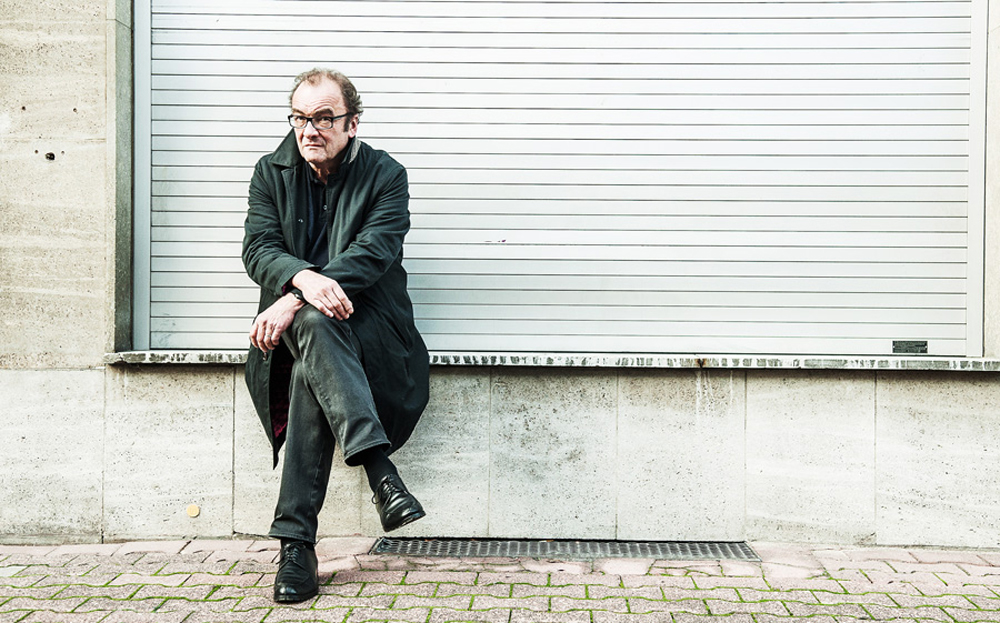The Interpreter’s Tale
by Niklaus Nuspliger

Two interpreters hard at work at the European Parliament in Brussels. Photo: Pietro Naj Oleari.
When I moved to Brussels from New York four years ago, I found the city impossible to pin down. It’s a place of contradictions and coexistence, a chaotic capital of bureaucrats and artists that can feel charming and repellent at the same time. It is one of the rare intersections for Belgians of both language groups, and in places it hardly feels like Belgium at all. The Haussmannian buildings in the bourgeois area of Châtelain serve as backdrops for movies set in Paris. The many brick stone houses reminded me of the UK; the historic center felt Flemish and Dutch. And when I first walked through the souk just behind the Gare du Midi I might have thought I was in Morocco, if it hadn’t been for the rain.
As elusive as the city was the subject I had moved here to write about: the European Union, this strange hybrid of a confederation and a federal state whose power never seemed to reveal itself. Each day I’d navigate through the European quarter and meet members of the European Parliament, eurocrats working for the Commission, lobbyists, thinktankers, and some of the countless diplomats representing the 28 (soon to be 27) member states. Many people in the EU bubble seemed to hold some power, but no one ever seemed really in charge. The EU has to uphold so many regional and political balances that decisions are often the result of negotiations and subtle procedures rather than of frontline power politics. And when things do get political, the ministers from Berlin, Paris, Warsaw, or Rome — and not the allegedly almighty eurocrats — often get the last word.
How do you tell the story of an institution as powerful, as essential, but also as complex and nebulous as the EU? It’s not an easy task for a journalist, and artists didn’t even bother — until the Viennese author Robert Menasse brought out Die Hauptstadt (The Capital) this September. “The first great EU novel,” as more than one critic has called it, has sat atop the German bestseller charts for months; it won last year’s Deutscher Buchpreis, the German-speaking world’s equivalent of the Booker, and in November the whole 450-page novel was read aloud over 17 hours on the stage of Berlin’s Volksbühne, and broadcast live on German radio. Die Hauptstadt is a state-of-the-nation novel for something bigger than a nation, a wild mix of political thriller and urban farce that finally puts human faces on faceless European institutions.

Menasse moved to Brussels in 2010 to learn about the European Union, and — as he told me when we met in a smoky café in Vienna last spring — he initially doubted whether the city’s eurocrats could be transformed into literary figures. He had not been sure it was possible to narrate the EU at all. But the more Menasse learned about the EU, the more urgent its future seemed to him; and that meant, for a few years, putting the novel to one side. He started publishing articles and giving speeches on Europe’s malaise and need for reform, and in 2012 Menasse released Der europäische Landbote (The European Courier), a book-length essay that advocated the abolition of nation-states and the creation of a single European republic. The book is fiercely critical of the EU, though for opposite reasons than those of the nationalist right. He flays the governments of member states for their national egoisms. And he idealizes eurocrats in the Commission — regularly tarred from Britain to Hungary as elitist, overpaid, and unelected meddlers — as highly capable, multilingual specialists working for the greater (European) good.
Menasse still believes in a united and federal Europe, but in the fictional Die Hauptstadt his heroes turn tragic. Most of Menasse’s protagonists working in and around the EU institutions are ultimately powerless; they have turned depressed, career-obsessed, hypocritical, or outright cynical. Fenia Xenopoulou, an ambitious Greek-Cypriot executive in the directorate-general for culture, tasks her team to propose a campaign to celebrate the European Commission’s 50th anniversary. Martin Susman, a melancholic Austrian eurocrat, suggests it center on the last survivors of the Holocaust — the better to present the EU as a bulwark against nationalism. Quickly the institutional clockwork starts ticking, leading to intrigue and backroom deals, before Europe’s national governments, acting in their own respective interests, kill the project altogether.
This bizarre search for a narrative within the European institutions is at the center of Die Hauptstadt. But the novel, like the EU itself, is broader and more multifaceted than that. A Brussels detective is forced to stop a murder investigation. A Holocaust survivor is moving into a retirement home. Austrian pig farmers lobby for trade opportunities with China. Professor Alois Erhart, a quirky economist and likely Menasse’s alter ego, tries breaking out of Brussels groupthink by suggesting that the EU build a new capital — on the grounds of Auschwitz!
With the specter of nationalism on the rise again, recalling Auschwitz might be no exaggeration. Brussels has become the focal point of Europe’s battle between populists and globalists, and Brexit and Trump brought a dull ambiance to town. (Last year some of my colleagues started reading Stefan Zweig, whose own calls for European unification died away on the eve of World War II.) Emmanuel Macron, with his explicitly European vocation, improved the mood, but after 70 years, and despite the Nobel Prize proudly displayed in the lobby of the Council building, the narrative of the EU as a peace project has faded. What can hold Europe together today? Can only a United States of Europe — as Menasse argues for, and as Martin Schulz, the leader of Germany’s Social Democrats, now advocates — overcome the EU’s contradictions? How to tell the story of an aging project that is still, despite all its flaws, one of the greatest achievements in European history?
In Die Hauptstadt, to everyone’s complete bafflement, a pig runs across Place Sainte-Catherine and all over Brussels. Nobody knows where it comes from or why it is there. A local newspaper tries to make some sense of the pig’s appearance and launches a readers’ contest to name it. Is it a lucky pig or a filthy swine? But the pig is as elusive as “Brussels,” which is portrayed as a cipher for radical Islam, a bureaucratic monster, or a postnational city lacking any common culture that newcomers could embrace. Maybe this is the right capital for Europe after all.